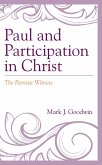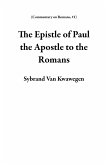Cultural Translation and Receptions of Paul in the First Four Centuries (eBook, ePUB)
Redaktion: Ábel, Frantisek
80,95 €
80,95 €
inkl. MwSt.
Sofort per Download lieferbar

40 °P sammeln
80,95 €
Als Download kaufen

80,95 €
inkl. MwSt.
Sofort per Download lieferbar

40 °P sammeln
Jetzt verschenken
Alle Infos zum eBook verschenken
80,95 €
inkl. MwSt.
Sofort per Download lieferbar
Alle Infos zum eBook verschenken

40 °P sammeln
Cultural Translation and Receptions of Paul in the First Four Centuries (eBook, ePUB)
Redaktion: Ábel, Frantisek
- Format: ePub
- Merkliste
- Auf die Merkliste
- Bewerten Bewerten
- Teilen
- Produkt teilen
- Produkterinnerung
- Produkterinnerung

Bitte loggen Sie sich zunächst in Ihr Kundenkonto ein oder registrieren Sie sich bei
bücher.de, um das eBook-Abo tolino select nutzen zu können.
Hier können Sie sich einloggen
Hier können Sie sich einloggen
Sie sind bereits eingeloggt. Klicken Sie auf 2. tolino select Abo, um fortzufahren.

Bitte loggen Sie sich zunächst in Ihr Kundenkonto ein oder registrieren Sie sich bei bücher.de, um das eBook-Abo tolino select nutzen zu können.
There are two overlapping themes which serve as the focus of Cultural Translation and Receptions of Paul in the First Four Centuries : (a) "reception" of the apostle Paul in subsequent Christian traditions, and (b) the hypothesis that while Paul himself continued to think as a Jew, he was subsequently re-interpreted by non-Jews in non-Jewish and anti-Jewish ways: the so-called "Paul within Judaism" school.
The distinctive focus of this volume is on the dynamic of "cultural translation," meaning, for example, the translation from the cultural world of Diaspora Judaism and its Septuagint to…mehr
- Geräte: eReader
- ohne Kopierschutz
- eBook Hilfe
- Größe: 4.42MB
Andere Kunden interessierten sich auch für
![Receptions of Paul during the First Two Centuries (eBook, ePUB) Receptions of Paul during the First Two Centuries (eBook, ePUB)]() Receptions of Paul during the First Two Centuries (eBook, ePUB)90,95 €
Receptions of Paul during the First Two Centuries (eBook, ePUB)90,95 €![Cultural Translation and Receptions of Paul in the First Four Centuries (eBook, PDF) Cultural Translation and Receptions of Paul in the First Four Centuries (eBook, PDF)]() Cultural Translation and Receptions of Paul in the First Four Centuries (eBook, PDF)80,95 €
Cultural Translation and Receptions of Paul in the First Four Centuries (eBook, PDF)80,95 €![Paul and Participation in Christ (eBook, ePUB) Paul and Participation in Christ (eBook, ePUB)]() Mark J. GoodwinPaul and Participation in Christ (eBook, ePUB)68,95 €
Mark J. GoodwinPaul and Participation in Christ (eBook, ePUB)68,95 €![Paul and His Letters (eBook, ePUB) Paul and His Letters (eBook, ePUB)]() F. B. A. AsieduPaul and His Letters (eBook, ePUB)91,95 €
F. B. A. AsieduPaul and His Letters (eBook, ePUB)91,95 €![Paul and the Therapy of Desire (eBook, ePUB) Paul and the Therapy of Desire (eBook, ePUB)]() Nélida Naveros CórdovaPaul and the Therapy of Desire (eBook, ePUB)14,95 €
Nélida Naveros CórdovaPaul and the Therapy of Desire (eBook, ePUB)14,95 €![The Epistle of Paul the Apostle to the Romans (Commentary on Romans, #1) (eBook, ePUB) The Epistle of Paul the Apostle to the Romans (Commentary on Romans, #1) (eBook, ePUB)]() Sybrand van KwawegenThe Epistle of Paul the Apostle to the Romans (Commentary on Romans, #1) (eBook, ePUB)2,49 €
Sybrand van KwawegenThe Epistle of Paul the Apostle to the Romans (Commentary on Romans, #1) (eBook, ePUB)2,49 €![Receptions of Paul during the First Two Centuries (eBook, PDF) Receptions of Paul during the First Two Centuries (eBook, PDF)]() Receptions of Paul during the First Two Centuries (eBook, PDF)90,95 €
Receptions of Paul during the First Two Centuries (eBook, PDF)90,95 €-
-
-
There are two overlapping themes which serve as the focus of Cultural Translation and Receptions of Paul in the First Four Centuries : (a) "reception" of the apostle Paul in subsequent Christian traditions, and (b) the hypothesis that while Paul himself continued to think as a Jew, he was subsequently re-interpreted by non-Jews in non-Jewish and anti-Jewish ways: the so-called "Paul within Judaism" school.
The distinctive focus of this volume is on the dynamic of "cultural translation," meaning, for example, the translation from the cultural world of Diaspora Judaism and its Septuagint to Greek philosophical and Greek Christian categories. The contributions to the book are diverse, ranging from younger to more senior scholars from both North America and Europe.
The distinctive focus of this volume is on the dynamic of "cultural translation," meaning, for example, the translation from the cultural world of Diaspora Judaism and its Septuagint to Greek philosophical and Greek Christian categories. The contributions to the book are diverse, ranging from younger to more senior scholars from both North America and Europe.
Produktdetails
- Produktdetails
- Verlag: Bloomsbury eBooks US
- Seitenzahl: 542
- Erscheinungstermin: 10. Juli 2025
- Englisch
- ISBN-13: 9781978717626
- Artikelnr.: 74179294
- Verlag: Bloomsbury eBooks US
- Seitenzahl: 542
- Erscheinungstermin: 10. Juli 2025
- Englisch
- ISBN-13: 9781978717626
- Artikelnr.: 74179294
- Herstellerkennzeichnung Die Herstellerinformationen sind derzeit nicht verfügbar.
Frantisek Ábel is professor of New Testament at the Evangelical Lutheran Theological Faculty of Comenius University in Bratislava, Slovakia
Introduction, Frantisek Ábel
Part I: Theorizing Paul the Apostle in Cultural Contexts
Chapter 1: Did Paul Truly Become All Things to All People? Revisiting the
Claim in 1 Corinthians 9, Esther Kobel
Chapter 2: From Paul to Nicaea: Social Memory Theory and the Inculturation
of the Gospel into Graeco-Roman Contexts, Sandra Huebenthal
Chapter 3: Paul and Roman Citizenship, Valéria Terézia Danciaková
Chapter 4: Clothes Make the Jew - Even in the Diaspora, Hans Förster
Chapter 5: Examining Paul's Thought and Its Development in Light of the
First Jewish Revolt, Kenneth Atkinson
Chapter 6: Contextualizing Paul: Between the Maccabean Wars of 167-141 BCE
and the Jewish War of 66-70 CE, James Hamilton Charlesworth
Chapter 7: The Emergence of Proto-Supersessionism in Rome, William S.
Campbell
Chapter 8: Cultural Translation in Corinth: An Application of Kathy
Ehrensperger's Method in the Formation of Gentile Identity in 1
Corinthians, J. Brian Tucker
Part II: Paul the Apostle Refracted in the Canon
Chapter 9: Swimming in the Sea of Paul: Mark, Matthew, Marcion, and the
Formation of the New Testament, Joshua D. Garroway
Chapter 10: Remembering the Antioch Incident: Pauline Reception in Matthew
in an Antiochene Context, Michaela Prihracki
Chapter 11: Paul in the Context of the Ephesian Tradition: The Image of the
Apostle and the City Through the Lens of Different Genres and Collective
Memory, Jirí Lukes
Chapter 12: Was Luke a "Good" Disciple of Paul? Luke's Reception of the
Pauline Gospel of Justification, Simon Butticaz
Chapter 13: Pauline and Early Post-Pauline Statements on the "Gospel," on
"Israel," on the "Law," and on "Works", Michael Bachmann
Chapter 14: The Transformation of Paul's "Works of the Law" into "Honest
Deeds" in the Letter to Titus, Michael Scott Robertson
Chapter 15: Reception of Paul in 2 Peter 3:14-18 as an Early Witness to the
Emergence of an Antinomian Paul without Judaism, Jakub Michal Pogonowski
Part III: Paul's Judaism in Later Traditions
Chapter 16: Didache 6.2-3 and Paul the Apostle: Getting the Crux in
Perspective of the Apostolic Authority, Frantisek Ábel
Chapter 17: Tertullian, Theodoret, and Augustine on Paul's Pharisaic
Affiliation: Reception of Phil 3:5 and Paul's Jewishness in the First
Centuries, Ruben A. Bühner
Chapter 18: The Jewish Paul in Pelagius's Commentaries on the Pauline
Epistles, Stefan Krauter
Chapter 19: Older will Serve the Younger (Rom 9:12): Esau and Jacob in Paul
and in Tertullian, Kathy Ehrensperger
Chapter 20: Origen Has the Mind of Christ, Daniel Boyarin
Part I: Theorizing Paul the Apostle in Cultural Contexts
Chapter 1: Did Paul Truly Become All Things to All People? Revisiting the
Claim in 1 Corinthians 9, Esther Kobel
Chapter 2: From Paul to Nicaea: Social Memory Theory and the Inculturation
of the Gospel into Graeco-Roman Contexts, Sandra Huebenthal
Chapter 3: Paul and Roman Citizenship, Valéria Terézia Danciaková
Chapter 4: Clothes Make the Jew - Even in the Diaspora, Hans Förster
Chapter 5: Examining Paul's Thought and Its Development in Light of the
First Jewish Revolt, Kenneth Atkinson
Chapter 6: Contextualizing Paul: Between the Maccabean Wars of 167-141 BCE
and the Jewish War of 66-70 CE, James Hamilton Charlesworth
Chapter 7: The Emergence of Proto-Supersessionism in Rome, William S.
Campbell
Chapter 8: Cultural Translation in Corinth: An Application of Kathy
Ehrensperger's Method in the Formation of Gentile Identity in 1
Corinthians, J. Brian Tucker
Part II: Paul the Apostle Refracted in the Canon
Chapter 9: Swimming in the Sea of Paul: Mark, Matthew, Marcion, and the
Formation of the New Testament, Joshua D. Garroway
Chapter 10: Remembering the Antioch Incident: Pauline Reception in Matthew
in an Antiochene Context, Michaela Prihracki
Chapter 11: Paul in the Context of the Ephesian Tradition: The Image of the
Apostle and the City Through the Lens of Different Genres and Collective
Memory, Jirí Lukes
Chapter 12: Was Luke a "Good" Disciple of Paul? Luke's Reception of the
Pauline Gospel of Justification, Simon Butticaz
Chapter 13: Pauline and Early Post-Pauline Statements on the "Gospel," on
"Israel," on the "Law," and on "Works", Michael Bachmann
Chapter 14: The Transformation of Paul's "Works of the Law" into "Honest
Deeds" in the Letter to Titus, Michael Scott Robertson
Chapter 15: Reception of Paul in 2 Peter 3:14-18 as an Early Witness to the
Emergence of an Antinomian Paul without Judaism, Jakub Michal Pogonowski
Part III: Paul's Judaism in Later Traditions
Chapter 16: Didache 6.2-3 and Paul the Apostle: Getting the Crux in
Perspective of the Apostolic Authority, Frantisek Ábel
Chapter 17: Tertullian, Theodoret, and Augustine on Paul's Pharisaic
Affiliation: Reception of Phil 3:5 and Paul's Jewishness in the First
Centuries, Ruben A. Bühner
Chapter 18: The Jewish Paul in Pelagius's Commentaries on the Pauline
Epistles, Stefan Krauter
Chapter 19: Older will Serve the Younger (Rom 9:12): Esau and Jacob in Paul
and in Tertullian, Kathy Ehrensperger
Chapter 20: Origen Has the Mind of Christ, Daniel Boyarin
Introduction, Frantisek Ábel
Part I: Theorizing Paul the Apostle in Cultural Contexts
Chapter 1: Did Paul Truly Become All Things to All People? Revisiting the
Claim in 1 Corinthians 9, Esther Kobel
Chapter 2: From Paul to Nicaea: Social Memory Theory and the Inculturation
of the Gospel into Graeco-Roman Contexts, Sandra Huebenthal
Chapter 3: Paul and Roman Citizenship, Valéria Terézia Danciaková
Chapter 4: Clothes Make the Jew - Even in the Diaspora, Hans Förster
Chapter 5: Examining Paul's Thought and Its Development in Light of the
First Jewish Revolt, Kenneth Atkinson
Chapter 6: Contextualizing Paul: Between the Maccabean Wars of 167-141 BCE
and the Jewish War of 66-70 CE, James Hamilton Charlesworth
Chapter 7: The Emergence of Proto-Supersessionism in Rome, William S.
Campbell
Chapter 8: Cultural Translation in Corinth: An Application of Kathy
Ehrensperger's Method in the Formation of Gentile Identity in 1
Corinthians, J. Brian Tucker
Part II: Paul the Apostle Refracted in the Canon
Chapter 9: Swimming in the Sea of Paul: Mark, Matthew, Marcion, and the
Formation of the New Testament, Joshua D. Garroway
Chapter 10: Remembering the Antioch Incident: Pauline Reception in Matthew
in an Antiochene Context, Michaela Prihracki
Chapter 11: Paul in the Context of the Ephesian Tradition: The Image of the
Apostle and the City Through the Lens of Different Genres and Collective
Memory, Jirí Lukes
Chapter 12: Was Luke a "Good" Disciple of Paul? Luke's Reception of the
Pauline Gospel of Justification, Simon Butticaz
Chapter 13: Pauline and Early Post-Pauline Statements on the "Gospel," on
"Israel," on the "Law," and on "Works", Michael Bachmann
Chapter 14: The Transformation of Paul's "Works of the Law" into "Honest
Deeds" in the Letter to Titus, Michael Scott Robertson
Chapter 15: Reception of Paul in 2 Peter 3:14-18 as an Early Witness to the
Emergence of an Antinomian Paul without Judaism, Jakub Michal Pogonowski
Part III: Paul's Judaism in Later Traditions
Chapter 16: Didache 6.2-3 and Paul the Apostle: Getting the Crux in
Perspective of the Apostolic Authority, Frantisek Ábel
Chapter 17: Tertullian, Theodoret, and Augustine on Paul's Pharisaic
Affiliation: Reception of Phil 3:5 and Paul's Jewishness in the First
Centuries, Ruben A. Bühner
Chapter 18: The Jewish Paul in Pelagius's Commentaries on the Pauline
Epistles, Stefan Krauter
Chapter 19: Older will Serve the Younger (Rom 9:12): Esau and Jacob in Paul
and in Tertullian, Kathy Ehrensperger
Chapter 20: Origen Has the Mind of Christ, Daniel Boyarin
Part I: Theorizing Paul the Apostle in Cultural Contexts
Chapter 1: Did Paul Truly Become All Things to All People? Revisiting the
Claim in 1 Corinthians 9, Esther Kobel
Chapter 2: From Paul to Nicaea: Social Memory Theory and the Inculturation
of the Gospel into Graeco-Roman Contexts, Sandra Huebenthal
Chapter 3: Paul and Roman Citizenship, Valéria Terézia Danciaková
Chapter 4: Clothes Make the Jew - Even in the Diaspora, Hans Förster
Chapter 5: Examining Paul's Thought and Its Development in Light of the
First Jewish Revolt, Kenneth Atkinson
Chapter 6: Contextualizing Paul: Between the Maccabean Wars of 167-141 BCE
and the Jewish War of 66-70 CE, James Hamilton Charlesworth
Chapter 7: The Emergence of Proto-Supersessionism in Rome, William S.
Campbell
Chapter 8: Cultural Translation in Corinth: An Application of Kathy
Ehrensperger's Method in the Formation of Gentile Identity in 1
Corinthians, J. Brian Tucker
Part II: Paul the Apostle Refracted in the Canon
Chapter 9: Swimming in the Sea of Paul: Mark, Matthew, Marcion, and the
Formation of the New Testament, Joshua D. Garroway
Chapter 10: Remembering the Antioch Incident: Pauline Reception in Matthew
in an Antiochene Context, Michaela Prihracki
Chapter 11: Paul in the Context of the Ephesian Tradition: The Image of the
Apostle and the City Through the Lens of Different Genres and Collective
Memory, Jirí Lukes
Chapter 12: Was Luke a "Good" Disciple of Paul? Luke's Reception of the
Pauline Gospel of Justification, Simon Butticaz
Chapter 13: Pauline and Early Post-Pauline Statements on the "Gospel," on
"Israel," on the "Law," and on "Works", Michael Bachmann
Chapter 14: The Transformation of Paul's "Works of the Law" into "Honest
Deeds" in the Letter to Titus, Michael Scott Robertson
Chapter 15: Reception of Paul in 2 Peter 3:14-18 as an Early Witness to the
Emergence of an Antinomian Paul without Judaism, Jakub Michal Pogonowski
Part III: Paul's Judaism in Later Traditions
Chapter 16: Didache 6.2-3 and Paul the Apostle: Getting the Crux in
Perspective of the Apostolic Authority, Frantisek Ábel
Chapter 17: Tertullian, Theodoret, and Augustine on Paul's Pharisaic
Affiliation: Reception of Phil 3:5 and Paul's Jewishness in the First
Centuries, Ruben A. Bühner
Chapter 18: The Jewish Paul in Pelagius's Commentaries on the Pauline
Epistles, Stefan Krauter
Chapter 19: Older will Serve the Younger (Rom 9:12): Esau and Jacob in Paul
and in Tertullian, Kathy Ehrensperger
Chapter 20: Origen Has the Mind of Christ, Daniel Boyarin







